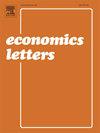The efficient market hypothesis when time travel is possible
IF 2.1
4区 经济学
Q2 ECONOMICS
引用次数: 0
Abstract
This paper extends the Efficient Markets Hypothesis (EMH) into a novel setting in which traders can travel back in time to exploit future information. We consider a fully specified trading model with risk-neutral, rational investors and a single, infinitely-lived asset. Agents can, at a fixed cost, build time machines, travel to the past, and trade using knowledge of future dividends and prices. Under a self-consistent, single-timeline theory of time travel, we show that no arbitrage opportunities can persist. In equilibrium, the asset price fully reflects not only all current and past information but also all future information that could have been acted upon by backward-travelling arbitrageurs. We state and prove an Extended Efficient Markets Hypothesis (EEMH), showing that time travel does not undermine but rather reinforces the no-arbitrage conditions at the heart of the EMH. We conclude by discussing the relevance of known constraints on the EMH, alternative theories of time travel and the challenges of empirically identifying time-travelling traders. Journal of Economic Literature Codes: G14, Z10.
求助全文
约1分钟内获得全文
求助全文
来源期刊

Economics Letters
ECONOMICS-
CiteScore
3.20
自引率
5.00%
发文量
348
审稿时长
30 days
期刊介绍:
Many economists today are concerned by the proliferation of journals and the concomitant labyrinth of research to be conquered in order to reach the specific information they require. To combat this tendency, Economics Letters has been conceived and designed outside the realm of the traditional economics journal. As a Letters Journal, it consists of concise communications (letters) that provide a means of rapid and efficient dissemination of new results, models and methods in all fields of economic research.
 求助内容:
求助内容: 应助结果提醒方式:
应助结果提醒方式:


